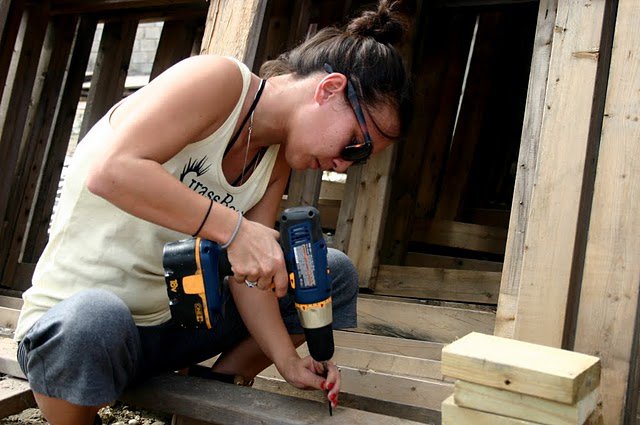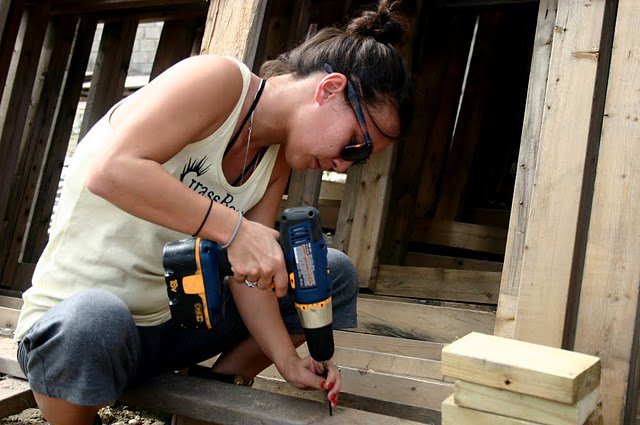Tara Yip-Bannicq is an American-French-Chinese “Third Culture Kid” who has lived in the United States, Indonesia, China, Canada, Argentina, the United Kingdom and now Haiti. After completing her master’s degree in International Political Economy at the London School of Economics, the self-proclaimed “disaster chaser” began her career as an aid worker.
In the past two years, Yip-Bannicq, 26, has supported the coordination of child protection programs, participated in emergency search and recovery efforts, distributed essential food supplies and clothing, as well as demolished and cleared buildings.
In 2009, she was in Sumatra doing post-earthquake relief work. The following year, she did search and recovery work in Guatemala after the Pacaya Volcano erupted and tropical storm Agatha hit. In June 2010, Yip Bannicq moved to Haiti to volunteer with Hands On Response after last year’s catastrophic earthquake.
Since December 2010, she has been working as Education Resource Coordinator at European Disaster Volunteers in Port-au-Prince, designing and implementing their scholarship program to put up to 100 children in school for an academic year.
1. How did you get to where you are now?
I’ve known since I was 8 years old that I wanted to work in development and service. I had my master’s, knowledge of the language and I had right background so I started volunteering and gaining experience… and then I basically showed up on the ground and applied for jobs and got hired; I’ve been going from there ever since.
2. What is your typical day like?
No two days are ever alike. Everyday, especially working and living in Haiti, I get a constant feeling of “You just can’t make this shit up.”
I spend some time doing backend things on the computer such as scheduling, creating Monitoring and Evaluation strategies and front-end things which can range from arranging logistics for a supply run to Leogane (the epicenter of the quake) to translating or disassembling wooden trusses. Everything is a challenge in this field, especially in Haiti. My days don’t fit into boxes. It’s all about being able to adapt to that ‘outside of the box’ element.
3. How does being a TCK benefit your career?
It has made me inherently adaptable and flexible to constantly changing conditions. I’m ready to think on my feet, and not lose my cool when things get frustrating. It’s also taught me how to relate to local cultures, even those I have no background in or experience with.
I don’t think there’s anything that can prepare you for disaster relief work better than being a TCK. The unique skills and experiences you have makes you a lot more adaptable and gives you a higher threshold for tolerance.
4. Is there anything about being a TCK that has held you back in your career?
In this career, I don’t think there’s anything that held me back as a TCK. But, as a TCK I know I’m not going be here forever, having moved around a lot as a child. I think that’s a good thing, but it’s also really hard.
5. What advice would you give to TCKs who want to pursue humanitarian aid work?
In order to be make disaster relief a financially viable career, one needs to be fluent in a language or two other than English, usually French, which is the global NGO language. It helps if you have technical degree in engineering, construction or carpentry, or have a master’s degree in French and development issues, especially disaster relief and management.
Photos by Stefanie Chang, Michelle Young, or courtesy of Tara Yip-Bannicq.
6. How has it been building short-term relationship with the local people as well as your colleagues?
The locals and expats are my friends and my family. The humanitarian aid community is small, so a lot of people end up working in the same environments. I really forged close bonds and friendships with them. They’re my support network in country and out of country. At the same time, I was finding my home in each country.
7. What was your most troubling experience while working abroad?
Working in disaster zones and the areas I have worked, personal security is not always the best. Sometimes “the shit hits the fan” and people close to me or around get hurt and people die. Also, constantly being aware and alert, and the lack of personal freedom because of security are hard, but necessary. Ultimately, I chose to do this work, so I chose to live the way I do.
8. How does it feel to help all these people and leave them?
It’s an existential crisis for me. I know my work is done when I feel I can be of better use somewhere else. As soon as I enter a new disaster zone, I’m planning my exit strategy. I just want to make a positive impact but it’s hard because I don’t want the countries I help to become dependent on foreign aid.
9. How long do you think you’ll continue doing this?
Probably for the next five to 20 years, or until I feel myself becoming one of those young jaded people.
10. What’s next for you?
I’d like to go into social enterprise eventually and work to merge social enterprise with disaster relief and sustainable development/change.

